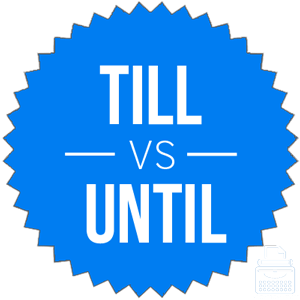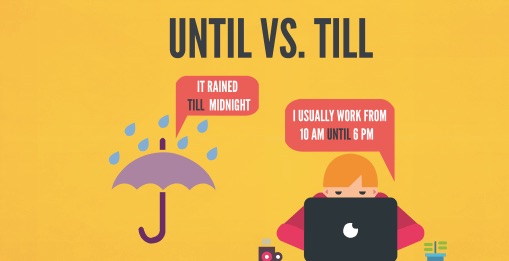Difference Between Till and UntilIntroductionThe English language is a complex and intricate system of communication used by millions of native and non-native users around the world. The language is often filled with subtle nuances and differences in meaning, which can confuse those learning it. One example is the difference between the words 'till' and 'until.' Till and Until are two common English words that express similar meanings. Though they are used interchangeably in some contexts, they have subtle differences in usage and meaning. This article will explain the differences between till and until with the help of examples and different use cases. 
Meaning of Till and UntilTill and Until are both used to express the idea of 'up to a certain time or point.' Till is a preposition that means 'up to the time of' or 'as far as.' It is used to talk about events or situations that will continue until a specific time. For example, 'I'm working till 5 pm'. Until is a conjunction used to talk about events or situations that will continue until a specific time. For example, 'We will stay here until dawn.' Grammatical UsageTill and Until can both be used in the same context; however, their usage has a subtle difference. Till is always used as a preposition, whereas Until can be used as both a preposition and a conjunction. Till is followed by a noun or a pronoun as a preposition. For example, 'I will wait till morning.' While when Until is used as a conjunction, it is followed by a clause. For example, 'I will wait until morning comes.' TenseTill and Until can also be used to discuss present and future events. Till is usually used in the present tense, whereas Until is used in the future tense. For example, 'I will stay here till tomorrow' (present tense) and 'I will stay here until tomorrow' (future tense). Negative SentencesTill and Until can also be used in negative sentences. Till is usually used in negative sentences to express the idea of 'not before' or 'not up to.' For example, 'I will not leave till tomorrow.' Until is usually used in negative sentences to express 'not after' or 'not beyond.' For example, 'I will not leave until tomorrow.' EmphasisTill and Until can also be used to add emphasis to a sentence. Till usually emphasizes that something will happen before a specific time. For example, 'I will do it till tomorrow.' Until it usually emphasizes that something will not happen after a specific time. For example, 'I will not do it until tomorrow.' ExamplesTill can be used in the following manner: I will stay here till the end of the week. Until it can be used in the following manner: I will stay here until Friday. Differences in UseTill is generally used when referring to a period that continues up to a certain point, while until refers to a specific topic. For example, "I will stay here till the end of the week" refers to a period that will last until the end of the week, while "I will stay here until Friday" refers to a specific point in time, Friday. Till means "up to the present time," while until means "up to the time when something begins or happens." For example, the sentence "I have been working here till now" means that the speaker has been working up to the present time, while the sentence "I will work here until the new job starts" implies that the speaker will work up to the time when the new job begins. Till is also used in expressions such as "till death do us part," while until is used in more formal contexts such as "until further notice." 
BackgroundThe words 'till' and 'until' have been used in English for centuries. 'till' is a shortened form of 'until' derived from the Old English word 'til.' The term 'until' is derived from the Middle English 'until.' Both words have been in use since the 14th century and have had a variety of meanings and uses throughout the years. SimilaritiesDespite their differences, 'till' and 'until' are similar. Both words indicate a period that extends up to a certain point. They can also refer to the fact that has yet to be reached. For example, one might say, "I will be here until 5 o'clock" or "I will be here till 5 o'clock." DifferencesDespite their similarities, some significant differences exist between 'till' and 'until.' The first difference is that 'till' is considered less formal than 'until.' This is because 'till' is considered more of a casual or colloquial term and is not typically used in legal writing. 
The second difference between 'till' and 'until' is that 'till' is used to express a period that has not yet ended, while 'until' is used to express a period that has not yet begun. For example, one might say, "I will be here till 5 o'clock," to indicate that they will remain there until 5 o'clock, while one might say, "I will be here until 5 o'clock," to suggest that they will arrive at the location at 5 o'clock. Difference Table
ConclusionIn conclusion, the words 'till' and 'until' are two different terms that have distinct meanings and uses. 'Till' is considered less formal than 'until' and is used to express a period that has not yet ended, while 'until' is used to express a period that has not yet begun. 'till' can also define a continuous period, while 'until' cannot. Understanding the differences between these two words can help English language users communicate more effectively and accurately. Till and Until are two common English words that express similar meanings. Though they are used interchangeably in some contexts, they have subtle differences in usage and meaning. Till is always used as a preposition, whereas Until can be used as both a preposition and a conjunction. Till is usually used in the present tense, whereas Until is used in the future tense. Till is generally used in negative sentences to express the idea of 'not before' or 'not up to.' Until is usually used in negative sentences to express 'not after' or 'not beyond.' Till usually emphasizes that something will happen before a specific time, whereas Until is typically used to emphasize that something will not occur after a particular time. While till and until are often used interchangeably in many contexts, they have different meanings and uses. Till is generally used when referring to a period that continues up to a certain point, while until refers to a specific topic. Till means "up to the present time," while until means "up to the time when something begins or happens." Till is also used in expressions such as "till death do us part," while until is used in more formal contexts such as "until further notice."
Next TopicDifference Between
|
 For Videos Join Our Youtube Channel: Join Now
For Videos Join Our Youtube Channel: Join Now
Feedback
- Send your Feedback to [email protected]
Help Others, Please Share









